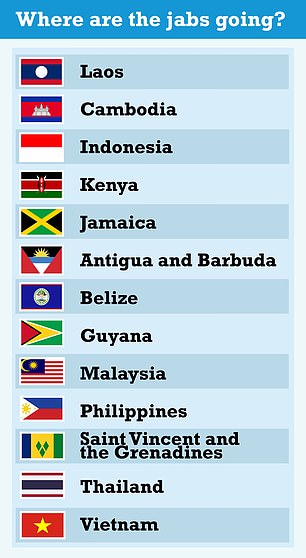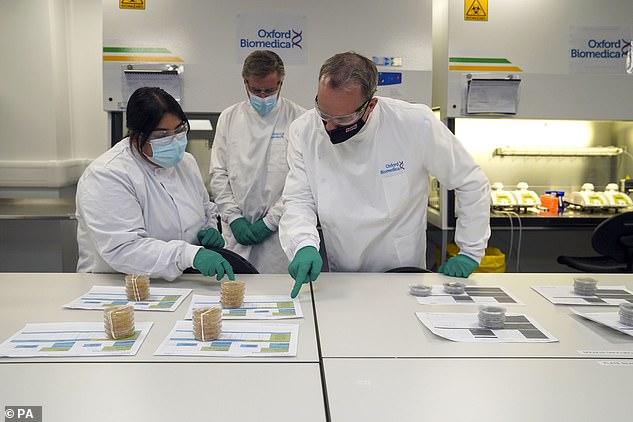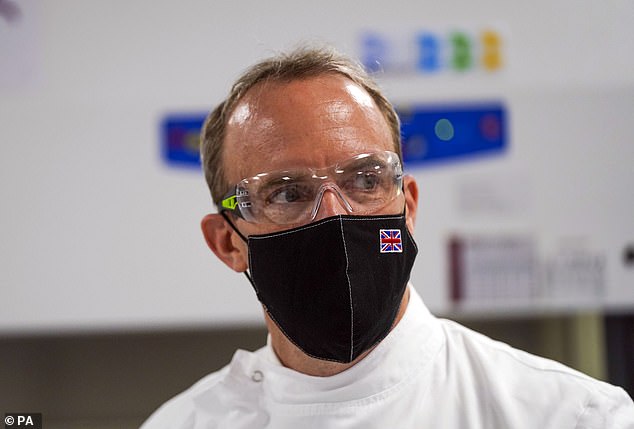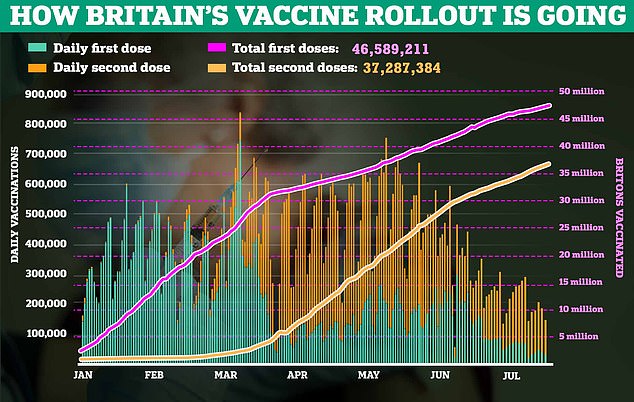
Four million donated AstraZeneca vaccine doses will be going directly from the UK to 13 nations, while another five million will be donated via the World Health Organization’s Covax scheme
Britain will this week begin delivering the first batch of the 100million coronavirus vaccines it has promised poorer nations, the Government announced today.
The first batch — consisting of excess AstraZeneca jabs — will be shipped to ‘vulnerable’ nations and Commonwealth allies including Jamaica, Kenya and the Philippines.
Leaders of the world’s major industrialised countries at the G7 summit in Cornwall last month pledged more than 1billion jabs to poorer countries.
Prime Minister Boris Johnson confirmed the UK’s contribution to the 1billion dose pledge is 100million between now and next June.
Foreign Secretary Dominic Raab today argued it was ‘crucially important’ for all nations to vaccinate their populations.
And in a message to western countries who have unused stockpiles of, he said that the World Health Organization and European Medicines Agency have both approved the British-designed vaccine as safe.
Fears about the Oxford University-designed jab’s side effects, including an slightly increased risk of blood clots, have seen it shunned in some wealthy countries.
Reports say Australia is currently sitting on 3milliuon unboxed doses of AstraZeneca, despite parts of the country being forced back into lockdown.
Despite Britain’s pledge to help vaccinate the world and end the pandemic, critics have slammed No10’s donation as ‘shamefully inadequate’ and ‘shoddy PR’.
More than half of the first batch being delivered will be distributed via the WHO’s Covax scheme, which delivers vaccines globally.

Britain has begun delivering the first batch of 100million vaccine doses to poorer nations, the Dominic Raab has announced. Pictured: The Foreign Secretary at a manufacturing site in Oxford today

Dominc Raab stressed that the World Health Organisation and European Medicines Agency hav approved the British-designed AstraZeneca vaccine as safe
World Bank and Covax unveil plan to speed vaccine supplies to developing countries
The World Bank and Covax have unveiled a financing mechanism to speed the supply of doses to developing countries.
The mechanism allows Covax to make advance purchases — at more competitive prices — from vaccine manufacturers based on aggregated demand across countries, using financing from the World Bank and other multilateral development banks.
World Bank President David Malpass said: ‘Accessing vaccines remains the single greatest challenge that developing countries face in protecting their people from the health, social, and economic impacts of the Covid pandemic.
‘This mechanism will enable new supplies and allow countries to speed up the purchase of vaccines. It will also provide transparency about vaccine availability, prices, and delivery schedules.’
The World Bank’s agreement with Covax, which is backed by the World Health Organization and the Global Alliance for Vaccines and Immunization (Gavi), will help low- and middle-income countries access additional doses of vaccines, on top of the fully-subsidized doses they are already receiving.
The new mechanism comes amid growing alarm about the slow pace of vaccinations in low-income countries.
Only 1.1 per cent of people in these countries have received at least one dose, compared to 26.9 per cent of the total world population, according to figures from Our World in Data.
Global health experts warn that the pandemic will continue to spread and spawn new variants until larger numbers of people across the globe are vaccinated.
Advertisement
The Foreign Secretary visited an AstraZeneca manufacturing site in Oxford today to announce the first doses are on their way.
Speaking after the visit, he said: ‘We succeeded in double-vaccinating 70 per cent of the adult population, the UK economy is bouncing back but we know we’re not going to be safe in the UK until everyone is safe.
‘That is why we have been leading the (international) vaccine roll-out to give enough doses to get the world vaccinated by the middle of next year, rather than the current trajectory, which is the end of 2024.’
Mr Raab said the UK was delivering on its G7 pledge of sending 100million surplus vaccines to the ‘poorest and most vulnerable countries around the world’ before the middle of 2022.
‘The first nine million doses will be going on Friday to countries from vulnerable countries in the Indo-Pacific, such as Laos, Cambodia, key partners like Indonesia, right the way through the Commonwealth countries from Kenya to Jamaica,’ he added.
‘I think what it shows, as well as the domestic rollout and the importance of coming out of the lockdowns in the UK, is that global Britain is also a lifesaving force for good in the world.’
Four million jabs will be going directly from the UK to 13 nations: Antigua and Barbuda, Belize, Cambodia, Guyana, Indonesia, Jamaica, Kenya, Laos, Malaysia, Philippines, Saint Vincent and the Grenadines, Thailand and Vietnam.
The other five million from the first batch will be offered to the WHO’s Covax programme, with destinations yet to be announced.
Indonesia will receive 600,000 doses, 300,000 will be sent to Jamaica and 817,000 are to be transported to Kenya, among other countries, the Foreign Office said.
Nick Dearden, director of campaign group Global Justice Now, suggested the Government’s decision to announce the donation today — on the same day the World Trade Organisation delayed a decision an intellectual property waiver for vaccine technology — was ‘shameful’.
He said: ‘Britain’s donations today are shamefully inadequate.
‘And the government wants to use this as a form of diplomacy, offering many doses on the basis of their strategic interests. This is a global health crisis, not an opportunity for vain self-promotion.
‘Worse still, this shoddy piece of PR went out on the very day the UK is blocking real solutions at the World Trade Organisation that would allow many of these countries to produce their own vaccines in far greater quantities than donations will ever achieve.
‘It shouldn’t be up to Dominic Raab to decide a country is strategically useful enough to deserve some of the UK’s leftover doses.
‘We should be building domestic manufacturing in those countries by waiving vaccine intellectual property and sharing technological know-how.’

Mr Raab, who is also First Secretary of State, joined the Prime Minister and fellow Cabinet colleague Therese Coffey in refusing to repeat Michael Gove’s assertion that it was ‘selfish’ to refuse a vaccine.
The Chancellor of the Duchy of Lancaster’s comment comes as the UK Government prepares to make being double-jabbed a condition of entry to nightclubs in September in a bid to increase the number of young people coming forward for inoculation.
Asked what he made of Mr Gove’s remark, Mr Raab said: ‘Look, I think people should get vaccinated for their own self-interest because it is far safer to do so, and I would encourage everyone to do so.
‘But it is true that it is also the best way to protect your family, your friends, your neighbourhood, your community and the country at large as we try and boost the rate beyond the 70 per cent of the adult population who have been vaccinated.’
Source link : https://www.dailymail.co.uk/news/article-9835051/UK-send-batch-100m-promised-vaccine-doses-poorer-nations.html











